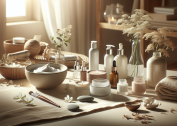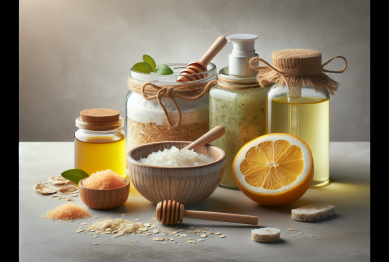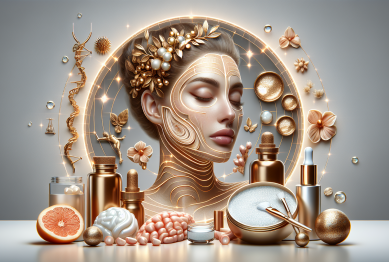Introduction: Why Beauty Sleep Matters More Than You Think
When people talk about “beauty sleep,” it often sounds like just another catchy phrase. But did you know that beauty sleep is rooted in real science? Getting adequate, quality sleep is more than just refreshing for your mind and body—it’s a key ingredient for achieving radiant, glowing skin. Beauty sleep for radiant skin isn’t a myth; it’s a proven phenomenon. In this article, we’ll explore the science behind beauty sleep, why it’s crucial for your skincare routine, and practical ways to enhance your sleep for better skin health.

How Sleep Affects Your Skin Health
The relationship between sleep and skin health is powerful and complex. While you rest, your body goes into repair mode, healing damaged cells, producing new collagen, and reducing inflammation. Here’s a closer look at what happens to your skin during different stages of sleep:
1. Increased Collagen Production
During deep sleep, the body ramps up collagen production, which is essential for maintaining skin elasticity and reducing wrinkles. A lack of sleep can hinder this process, leading to premature aging and dull, tired-looking skin.
2. Enhanced Blood Flow to the Skin
Adequate sleep promotes healthy blood flow to the skin, giving you that sought-after glow. Poor circulation from lack of sleep can cause dark circles and a pale complexion.
3. Reduction in Cortisol Levels
Sleep lowers cortisol levels, a hormone linked to stress and skin conditions like acne and eczema. When you’re sleep-deprived, your cortisol levels rise, which can trigger breakouts and worsen skin irritation.
4. Repair of Skin Damage
Throughout the night, your skin works hard to repair any damage caused by environmental factors like pollution and UV exposure. This restorative process is crucial for keeping your skin looking fresh and healthy.
The Science Behind Beauty Sleep: What Research Says
Multiple studies have highlighted the strong correlation between sleep quality and skin health. According to research published in Dermatology Times (2021), people who get at least 7–8 hours of sleep per night show fewer signs of aging compared to those who sleep less. Sleep deprivation, on the other hand, accelerates the aging process, resulting in increased fine lines, wrinkles, and uneven skin tone.
Additionally, a study conducted by The University of Manchester found that sleep deprivation decreases the skin’s ability to retain moisture, making it more prone to dryness and sensitivity. This is why establishing a healthy sleep routine is just as important as your skincare regimen for achieving radiant, youthful-looking skin.
Practical Tips to Optimize Your Beauty Sleep for Radiant Skin
Achieving beauty sleep for radiant skin doesn’t have to be complicated. With a few simple adjustments to your bedtime routine, you can transform your skin health overnight:
1. Set a Consistent Sleep Schedule
Your body thrives on routine. Aim to go to bed and wake up at the same time every day, even on weekends. This helps regulate your internal clock, ensuring you get deep, restorative sleep each night.
2. Create a Sleep-Conducive Environment
The ideal sleep environment should be dark, quiet, and cool. Consider using blackout curtains, a white noise machine, or a humidifier to create a space that promotes restful sleep. A bedroom temperature of around 65°F (18°C) is ideal for optimal skin rejuvenation.
3. Incorporate a Nighttime Skincare Routine
Before heading to bed, cleanse your face thoroughly to remove makeup, dirt, and pollutants. Follow it up with a hydrating serum and a night cream containing ingredients like hyaluronic acid and peptides, which support your skin’s natural repair processes.
4. Sleep on a Silk Pillowcase
Silk pillowcases can help reduce friction on your skin, minimizing the chances of developing wrinkles and fine lines. They’re also less absorbent than cotton, helping your skincare products stay on your skin rather than soaking into your pillow.
5. Elevate Your Head Slightly
Sleeping with your head slightly elevated can prevent fluid build-up around your eyes, reducing puffiness and dark circles in the morning. Consider using an extra pillow or a specially designed wedge pillow.
6. Avoid Alcohol and Caffeine Before Bed
Both alcohol and caffeine disrupt your sleep cycle, preventing you from entering the deeper stages of sleep that are essential for skin repair. Opt for herbal tea like chamomile instead, which promotes relaxation and better sleep.
The Link Between Sleep and Hormonal Balance
Another factor that makes beauty sleep crucial for radiant skin is its impact on hormone regulation. During deep sleep, the body produces more human growth hormone (HGH), which plays a vital role in maintaining healthy, youthful skin. Conversely, poor sleep raises cortisol levels, which can break down collagen and increase sebum production, leading to acne and breakouts.
Moreover, sleep influences melatonin production. Melatonin is not just a sleep hormone; it’s also a powerful antioxidant that helps combat free radicals, preventing premature skin aging. Ensuring quality sleep can, therefore, keep your hormones in check and your skin looking its best.
Beauty Sleep Myths Debunked: What You Need to Know
There’s a lot of misinformation surrounding beauty sleep. Let’s debunk some of the most common myths:
- Myth 1: You Can “Catch Up” on Sleep on Weekends While it’s true that extra sleep can help you feel refreshed, you can’t fully compensate for lost sleep during the week. A consistent sleep schedule is far more effective for maintaining healthy skin.
- Myth 2: Naps Are as Beneficial as a Full Night’s Sleep Naps can help alleviate tiredness, but they don’t provide the same restorative benefits as deep, uninterrupted sleep at night. The body needs to go through complete sleep cycles to optimize skin health.
- Myth 3: The Number of Hours You Sleep is All That Matters Quality matters just as much as quantity. Deep sleep stages are when most of the skin’s repair and rejuvenation occur, so focus on achieving deep, restful sleep rather than just logging hours.
Final Thoughts: Prioritize Your Beauty Sleep
Beauty sleep isn’t just a luxury; it’s a necessity for maintaining radiant, youthful skin. By understanding the science behind beauty sleep and incorporating the tips mentioned above, you can enhance your skin’s health, fight premature aging, and wake up every morning looking refreshed and glowing.
Remember, the road to healthy skin doesn’t end at skincare products. A good night’s sleep is just as important in your quest for a flawless complexion. Embrace beauty sleep for radiant skin and see the difference it makes!
References:
- Dermatology Times. (2021). The Impact of Sleep on Skin Health. Retrieved from Dermatology Times.
- University of Manchester. (2020). The Science of Beauty Sleep. Available at University of Manchester Studies.
- Harvard Medical School. (2021). Sleep and Skin Health. Accessed via Harvard Health Publishing.









